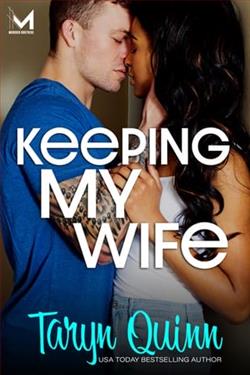Page 2 of Married to the Icy Duke
Suddenly, Charlotte understood. This man was the Duke of Arkley, her host. That made sense, since this vast, cavernous house was Arkley Hall. She had never met the duke in person, but she had heard of him. Everybody had.
It wasn’t often that Charlotte found herself beingtowered over, but the top of her head barely came to the man’s shoulder.
“An apology, I think, is in order,” the duke said pleasantly.
There was real fear in Lord Tabbish’s face when he looked at Charlotte.
“I am deeply sorry, Lady Charlotte,” he whispered, and she was sure that he believed it.
“Think nothing of it, you are quite forgiven,” Charlotte heard herself saying, lest the formidable duke thought that Lord Tabbish hadn’t suffered enough.
“Very good,” the duke said, and released Lord Tabbish’s shoulder. The smaller man hurtled off into the crowd like a rabbit with hounds on its tail. The duke glanced briefly over his shoulder, and Charlotte met his eyes.
Well,eye. He had one piercingly blue eye, and the other was covered by an eyepatch, of all things. Before she could say a word, even in thanks, he inclined his head infinitesimally and strode off into the crowd. People parted to let him pass by, and pushed together again in his wake, jostling Charlotte again.
She found herself standing there for a moment, a little bewildered. She knew, of course, that the duke of Arkley was something of a rival to Gabriel, being a key member of the Devils. She hadn’t imagined a man with a reputation like his to care about a singular woman beingjostledat his party.
Giving herself a little shake, Charlotte ploughed through the crowd, putting her odd host out of her mind, and atlastfound a quiet corner where she could breathe. There was a long table pushed up against the wall, covered with a silk tablecloth. Thetable had likely once held refreshments, which had long since been devoured, and now the table was empty except for a few shiny silver plates.
There was, however, a seat beside it, and Charlotte sank into it with a sigh, resting her elbow on the table. It wasn’t a particularly ladylike attitude, but she had long since stopped caring about that. According to the gossips and the scandal sheets, she had forfeited her femininity. Whether she had forfeited it after what her mother had done or after Sir Peter’s tumble into the fountain remained to be seen.
Charlotte’s warped reflection stared up at her from an abandoned silver plate. The theme for the party was The North Pole. She had no idea what it meant, but the ballroom had been decorated to resemble the icy Pole.
False snow made of flour and some clumpy, pale-blue substance lined the windowsills and other surfaces. Paper snowflakes hung from gilded portrait frames, and blocks of wood painted to look like ice were piled in the corner.
If that were real ice,Charlotte thought moodily, fanning herself,it would have long since melted by now.
The ladies were given dance-cards shaped like snowflakes, which hung from their wrists by pale blue ribbons. Charlotte’s, of course, was empty. Gabriel generally made an effort to dance with her, but in the house of his rival, he had sworn not to dance.
It was going to be a long evening. At least she had dressed to the theme, albeit by accident. Joan was the one who had chosen Charlotte’s gown for that night, a frothy, pale-blue creation which made her look somewhat like an icicle. Her chestnut hair hung down the back of her neck in ringlets, swept up from her face. She looked pretty enough, Charlotte knew that. They were an attractive family, and Gabriel was considered to be handsome, too.
And yet her looks meant nothing. She could be as pretty as anything, but she was still considered to be a violent harpy with a murderous, shameful mother.
A bad family,people said.Bad family with bad blood.
No wonder no one wanted to be associated with her. And risking children with her? Heavens, no. After all, the world knew that the previous duchess had abandonedherchildren. With such an unnatural mother, who only knew what Charlotte might be capable of?
On this delightful thought, a sudden, hiccupping sob drifted its way to Charlotte’s ears, nearly drowned out by the noise of the crowd.
At first, she was sure she’d imagined it. Then the sob returned, sounding very much as though somebody were trying to muffle their tears behind their hands. She sat up straighter, peering at the crowd. Nobody appeared to be crying.
Then the table beside her shivered, just a little. Charlotte stared down at the table with something like amazement. Could it be possible that here, at a party likethis, somebody had crawled under the table and begun to cry?
No one else seemed to hear, so Charlotte bent down and lifted the corner of the tablecloth.
A little boy was hiding under the table. Charlotte was no good at guessing the ages of children, but she suspected that he was two or three years old. He had a fluffy headful of black curls, and behind his small hands, covering his face, she was surprised to see a pair of small spectacles carefully perched on his nose. It was odd to see spectacles on a child as young as he, and they must have cost a great deal.
He peered up at her, and their eyes met. Abruptly, Charlotte sat up, peering around the room. Surelysomeonemust be looking for the child. Where was a nursemaid, or a frantic mother?
Nobody appeared to be searching for anything, so Charlotte peered under the table once more. The boy’s crying had eased a little, and he stared up at her curiously.
“Are you all right, my dear?” Charlotte tried. The boy only stared at her and did not reply.
“It is rather crowded in here,” Charlotte added. “Sometimes, when I meet certain people,Ifeel like crying. But you should not stay under the table. It’s awfully stuffy in there, and dusty, too. Why don’t you come out?”
The boy stared at her for a long moment, as if considering. Then he crawled forward, shuffling out from under the tablecloth, and stood before her.
Charlotte was no good at managing children. She had no younger siblings, and while her future, in her mind’s eye, included a family of her own, she did not consider herself to be particularly fond of small children. Still, it was clear that the poor child was distressed, and his cheeks were tearstained.















